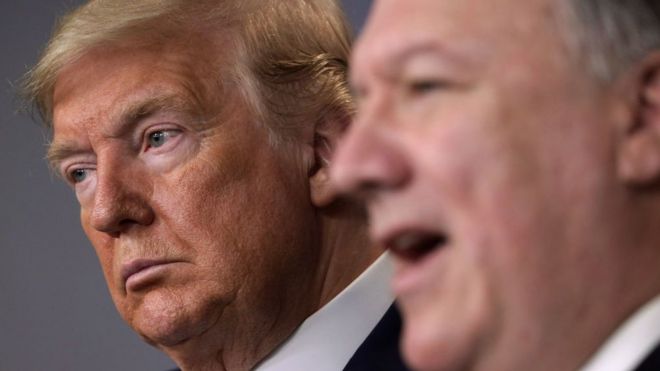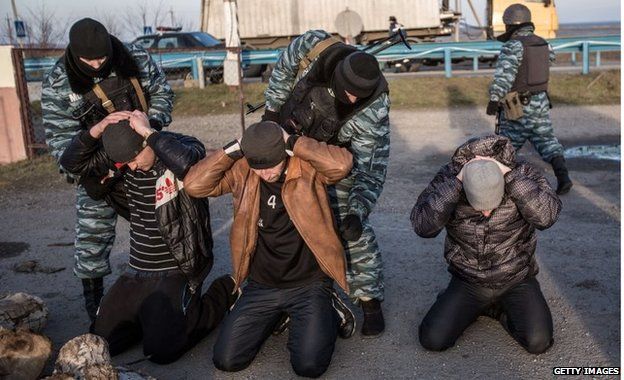 GETTY IMAGES
GETTY IMAGES
US President Donald Trump has labelled a Russian nationalist group as a terrorist organisation.
The announcement marks the first time the US government has applied the label to a white supremacist group.
"These actions are unprecedented," said Nathan Sales, assistant secretary of State for counterterrorism on Monday.
The Russian Imperialist Movement is believed to have offered military training to neo-Nazi fighters and aided election interference in the US.
The group is also thought to have been involved in neo-Nazi bombings at several locations in Sweden in 2016 and 2017.
The designation has been seen as an unusual move, as President Trump has previously been criticised for failure to do more about the threat of white supremacy.
- US labels Iran Guards force as terrorist
- Why so many US 'mass shooting' arrests suddenly?
- Smoothest invasion of modern times
The terror designation gives the US government authority to block Americans from providing material support or engage in financial dealings with such groups.
To receive such a designation, a group must be a foreign organisation and must engage in terrorist activity that threatens the security of US nationals or the national security of the US.
The Treasury Department can block any American assets belonging to a named terrorist group, and its members can be prevented from entering the US.
The label has been most frequently used for Islamist extremist groups.
The Russian Imperial Movement is an ultra-nationalist paramilitary group based in St Petersburg, where it has a training camp, with alleged links to white supremacist organisations in the West.
According to Swedish investigators, the group trained two of the three Swedish men convicted of bombings targeting a café and refugee centres in 2016, and a synagogue the following year.
The group is not believed to be state-sponsored but Russian President Vladimir Putin has "tolerated" its activities, the New York Times reports. It supported the Kremlin after the 2014 annexation of Ukraine's Crimea peninsula by recruiting fighters for the conflict.
 GETTY IMAGES
GETTY IMAGES
The US is also labelling three of the group's leaders as individual terrorists who will face separate sanctions.
"This is the first time the United States has ever designated white supremacists as terrorists, and this illustrates how seriously this administration takes the white supremacist terrorist threat," Mr Sales said. "We are doing things no previous administration has done to counter this threat."

A change of tone for White House

The designation of the Russian Imperial Movement as a terrorist organisation suggests the Trump administration is becoming increasingly concerned about a global threat from white supremacist movements.
The US has a long history of dealing with home-grown white nationalists and supremacists - including the Ku Klux Klan and the group behind the violent 2017 "Unite the Right" rally in Charlottesville, Virginia. Members of a Michigan-based extremist militia group staged the 1995 Oklahoma City bombing that killed 168, as well.
Now, however, the US is considering similar or even greater dangers sponsored or instigated from abroad, which could be a destabilising force not just in the US but among its allies, as well. Far-right extremism appears to have inspired the 2019 Christchurch shooting at a mosque in New Zealand and attacks in Scandinavia.
The White House move also represents a change of tone, given that Donald Trump last March said he thought white nationalist violence was the action of "a small group of people" and not a rising global threat.
As is often the case these past few years, the test will now be whether the president echoes the concerns of his administration officials - or contradicts them.

Last year, under a separate authority Mr Trump designated Iran's elite Revolutionary Guard Corps (IRGC) as a foreign terrorist organisation - the first time the US had declared another nation's military a terrorist entity.
The president has faced criticism for minimising the threat of white nationalist violence in the US, especially compared to other terror groups. He was widely condemned for his reaction to the deadly white supremacist rally in Virginia, and his comments suggesting there were "very fine people" on both sides.
This past summer, the US faced a wave of mass violence and attempted attacks, many of them targeting specific minority groups. The government lacks any federal penalties for acts of domestic terrorism, however, like those that exist for international acts of terror.

No comments:
Post a Comment